Education and Gender Equality: It’s about Quality and Context
By Joanne Lu
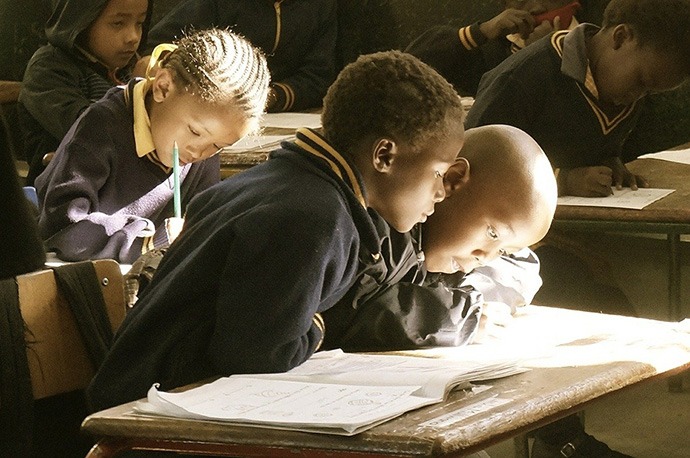
Boys and girls in schoolroom, Africa. Photo: ludi via Pixabay.
Girls’ education has been back in the news since the Taliban takeover in Afghanistan. Certainly, some of the attention stems from a desire to gauge whether the Taliban has progressed in its beliefs and values. But for Afghan communities, and many others around the world, girls’ education is so much more than just a benchmark.
Education is a fundamental human right that remains unattainable for millions of children around the world, but especially girls. By some estimates, girls are four times more likely to be out of school than boys from the same background.
But beyond the human rights argument for girls’ education, research continues to reveal that the nexus of Sustainable Development Goal 4 (Quality Education) and Goal 5 (Gender Equality) is crucial for the elimination of poverty and the equitable advancement of societies. That’s because girls and women play a pivotal role in transforming their communities from the ground up. When a girl is educated, she gets married later, tends to have fewer and healthier children, and prioritizes education for her children. Her family becomes more resilient, but so does her community. She is also able to contribute more to her family and community not just economically, but also politically and socially.
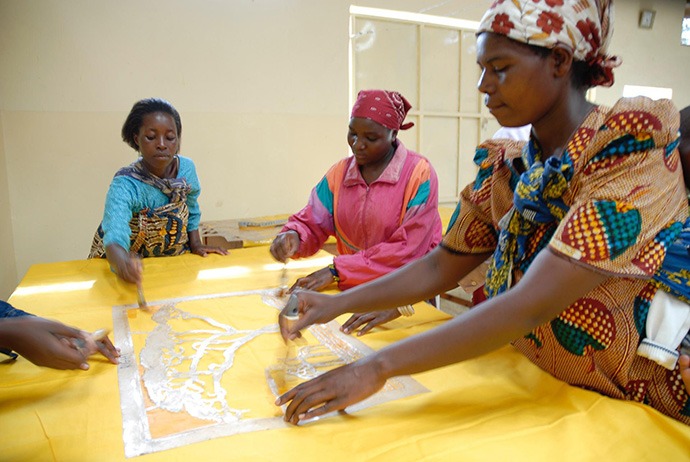
Women artisans, Tanzania. Photo: mizzo3 via Pixabay.
For many years the conversation around girls’ education centered on just getting them into school – even just primary school. But lately, the conversation has shifted to making sure that girls are getting a quality education. That includes secondary school, of course, but also university or college, or perhaps vocational training. The best option depends on each girl’s context.
For example, in Zambia, the Alliance for Children Everywhere (ACE) has noticed that many students who graduate from school struggle to find work because of high unemployment rates. That’s why they’ve begun building a “skills classroom” within their secondary school. It’s a space for students to learn entrepreneurial vocational skills that will allow them to not only earn a living, but also start businesses and employ others. Starting with home economics and hospitality skills, ACE hopes to eventually incorporate fabric and fashion design, and computer repair into the program as well. If all goes well, ACE hopes to open that classroom in the fall.
The Pygmy Survival Alliance in Rwanda has also found that the most rapid impact on gender equity occurs through vocational training. Within three years of initiating vocational training opportunities for women in the village of Cyaruzinge, they saw significant improvements in those women’s economic advancement and social status, as well as a drop in domestic violence. This is likely due to the immediate economic benefit the women bring to their household and community with their newfound job skills.
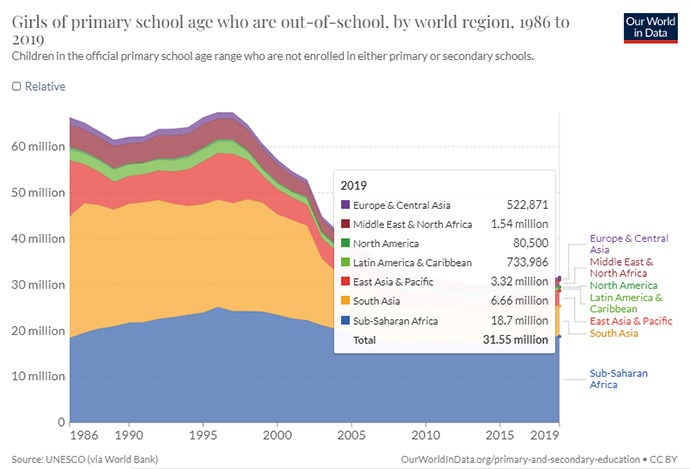
Screenshot, Our World in Data.
But in Afghanistan, where we began this discussion, things are a bit more complicated. Sahar has been a champion of girls’ education in Afghanistan since 2001. But because they are a U.S.-based organization and their work was built on a partnership with the previous government’s Ministry of Education, Sahar has had to minimize their presence in the country since the Taliban takeover. Currently, girls are only allowed to attend school through age 12, but according to Sahar, many girls under 12 have given up on school out of fear for their safety and a lack of teachers.
However, Sahar is still supporting grassroots education organizations in Afghanistan, including two mobile schools that serve nearly 500 children who are members of a nomadic tribe who did not have access to education prior to this effort. Founded by a young Afghan woman, these schools teach basic literacy skills to girls and boys of all ages. According to UNESCO, the literacy rate in Afghanistan is 43 percent, meaning more than 10 million youth and adults in the country are illiterate. In such a context, Sahar believes that primary education and literacy skills will go a long way in helping girls and boys thrive in vocational training later on. Especially now that the Taliban has banned education for girls past age 12, vocational training at home, such as midwifery, sewing, and farming will be the only option for them as they get older.
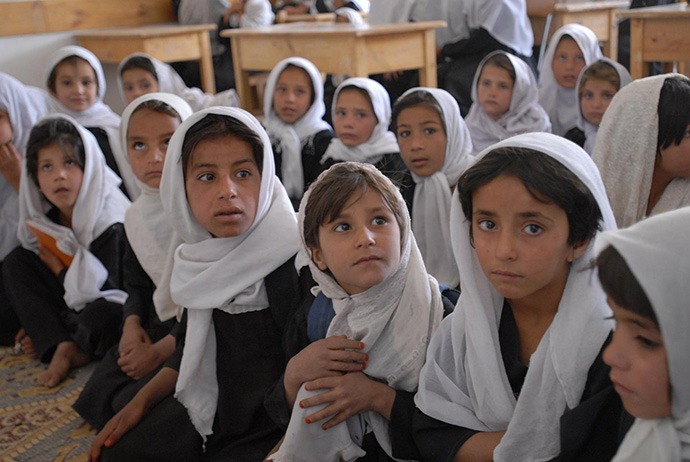
Schoolgirls, pre-Taliban Afghanistan. Photo: akshayapatra via Pixabay.
Unfortunately, the COVID pandemic has exacerbated the obstacles that girls around the world face to getting a quality education. The UN Children’s Fund (UNICEF) estimates that 147 million children have missed at least half of their in-person schooling due to pandemic closures. As discussed in the video below, every organization working on education has had to adapt to these evolving challenges, whether by adjusting their school schedules, curricula or services.
But school is more than just a place of academic learning. For many girls, especially, it’s a place of safety, health and empowerment. A recent study of nearly 400 of the hardest-to-reach rural adolescent girls in East Africa found that nearly a third of the girls dropped out of school during COVID. The economic fallout of the pandemic was a major factor, but more than half of them also dropped out because they were or recently had become pregnant.
Tostan has been perhaps uniquely positioned to reach women and girls during this time of uneven schooling and isolation because they provide solutions that help communities where quality formal school has not typically been available, especially to women and girls. While Tostan believes that primary education is necessary and vocational training is useful, they also think it’s equally important to educate women and girls on democracy, health, human rights, and community engagement. Through “nonformal empowering education” modules in local languages, Tostan helps women and girls gain a voice, participate in community dialogues, and understand their rights and responsibilities.
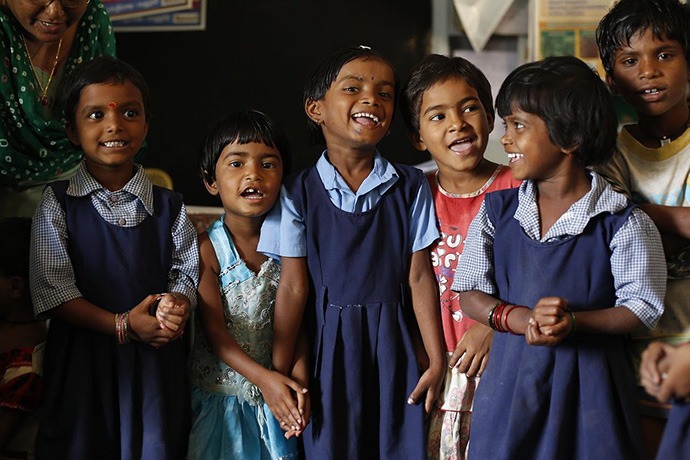
School children in India. Photo: akshayapatra via Pixabay.
As organizations continue to adjust to the ever-changing landscape of education in a post-pandemic world, it’s clear that there is no one-size-fits-all approach. But, by following the lead of local communities, we can continue to make sure that every girl has access to education – and not just any education, but quality education.
The following GlobalWA members are providing quality education and helping break down gender inequality through their programs in low- and middle-income countries.
Over the past 30 years buildOn has constructed more than 2,000 schools in eight of the economically poorest countries on the planet. The communities where buildOn works have no adequate school structure – students are squeezed into dark and crumbling mud buildings, have to walk many miles to a neighboring village, or simply can’t attend school at all. Additionally, in many of these places girls are not traditionally educated, and there are few opportunities for adult women.
When a community partners with buildOn they agree to send girls to school in equal numbers with boys and give women leadership opportunities on the worksite. After construction of the new school is complete, buildOn works closely with community leaders to enroll out-of-school children by influencing parents, creating accelerated learning opportunities for older children, or covering school supplies through microenterprise initiatives. Today, more than 275,000 children are attending buildOn schools and 49% of these students are female.
buildOn’s Adult Literacy Program also gives parents, particularly women, the education they need to build a better life for themselves and their children. Taught in the evenings, in the same schools their children attend by day, these classes teach adults to read, write, and do basic math. Students then put these skills to use through income-generating activities such as beekeeping, animal husbandry, and textile production. More than 28,000 adults have participated in this innovative program, 79% of them women.
FIUTS has hosted two cohorts of student leaders from Brazil, India, Indonesia, Nigeria, Russia, and Tunisia as part of the Study of the U.S. Institute on Education and the Future of Work. After an intensive 5-week exchange experience, participants return to their home countries to implement a Community Action Project – a training or workshop that they design to address the changing nature of work and education in their own communities. Community Action Projects delivered by alumni often focus on the intersection of education, employment, and gender equality and have included empowering women through education in India, promoting women’s leadership in the healthcare field in Brazil, combating sexual violence on college campuses in Indonesia, and more. We are looking forward to hosting another cohort of this program in summer 2022! Study of the U.S. Institutes (SUSI) for Student Leaders are short-term academic programs for groups of undergraduate leaders from around the world that promote a better understanding of the people, institutions, and culture of the United States. SUSI is a program of the U.S. Department of State, Bureau of Educational and Cultural Affairs. FIUTS hosts this program in partnership with Meridian International Center.
Education, gender equality, and economic prosperity are inextricably linked
Mona Foundation works to alleviate global poverty through education, gender equality, and community transformation. We currently partner with 23 grassroots initiatives in 14 countries to educate and empower over 800,000 students in need, particularly women and girls. While it is widely accepted that investing $1 in education adds $10 in economic growth, in Mona’s experience, educating a girl multiplies this impact by 100. Kali’s story is a great example. Educated women tend to marry at a later age, have fewer and healthier children, earn higher incomes, spend 90% on their families, and directly impact the development of their communities. All these factors help lift households out of poverty, benefit generations, and transform communities.
But to achieve a gender-just society, education needs to be transformed to teach the lessons of equality, justice and ethics alongside language, math, and science. Mona’s grassroots partners are leading this transformation — helping girls see themselves as equal, autonomous persons worthy of respect, and helping boys reframe their role as champions of equality and justice for the betterment of their communities. This video from Study Hall Educational Foundation, a Mona partner since 2008, is an example of our growing experience with a fundamental truth: education, gender equality, and economic prosperity are inextricably linked.
Young women in Cyaruzinge Village, Rwanda are searching for a way to make a future that provides food security, decent housing, and meaning in their lives. They want to learn and contribute, but they face many challenges, such as poverty, social isolation, and lack of successful role models. While there is no lack of desire, there is a real lack of support and guidance. Pygmy Survival Alliance promotes vocational education for young women to learn job skills, raise their social status and enhance gender equity at home and in their community. PSA’s vocational education project provides counselling, tuition, tools, protective equipment, raw materials, transportation, and ongoing support for personal growth and development. Partnerships between like-minded teens, educators, and employers have established a pipeline out of poverty for these women in the lowest level of social standing. Successful training in building trades, hair styling, and dressmaking create new job opportunities and income. This project helps teens avoid the risks of substance abuse, unplanned pregnancy, social isolation, depression, and low self-esteem that are common in this age group. It helps create hope for a better future, and a sense of purpose and possibility rather that feelings of alienation, impotence, and futility. Successful participation in a vocational-skill-building process gives these young minds a chance to stretch and blossom as adults and leaders.
Since 2003, Sahar has worked to build, repair, and supply the needs of 25 girls schools in Balkh province of Afghanistan while also training teachers and improving the curriculum. Sahar has also designed and implemented educational programs to close gender gaps. Through the Early Marriage Prevention Program, Sahar worked to break down the barrier and help girls pursue their educational goals. Men as Partners in Change Program was designed to work together, allying with men and creating communities that recognize the value of both genders. The two programs were put on hold after the Taliban took over the country, and we plan to resume the programs carefully and strategically when it is safe to do so. Currently, Sahar is working collaboratively with grassroots organizations based in Afghanistan and equipping them with evidence-informed curricula, project management, training, and support to help advance their efforts across the country. We are actively supporting the operations of two mobile schools that serve nearly 500 children who are members of a nomadic tribe and have not had access to education prior to this effort. Founded by a remarkable young Afghan woman, these schools are teaching basic literacy skills to girls and boys of all ages.
Our goal for the SE Asia Foundation is to eliminate poverty. Since the most direct way to do that is by educating girls, we keep our focus there – educating and providing for the wellbeing of girls and women. An educated girl will marry later, have fewer and healthier children, make sure those children receive an education, experience less discrimination, have significantly higher earning potential, and will uplift her entire community. As our motto says: “It takes a girl to raise a village”.
As we work in Cambodia, Myanmar and Thailand, we seek out grassroots, locally-based NGOs doing an exemplary job of providing these educational and training opportunities. We then partner with those organizations by providing funding along with training and coaching to improve the long-term sustainability of their organizations.
Further information is available from our Founder, Bill Taylor, at 206-972-0817 and bill@seafund.org
Spreeha from its inception has been working to provide quality education to underserved communities. Our efforts to empower people through education include raising awareness within the community and increasing skills among students and community members in pre- and after-school programs, scholarship program, education counselling and awareness programs, and adolescent girls club.
These programs offer tools for girl students to gain access to a level playing field to attain their dreams and be successful in life. The adolescent girls club provides life-skill education to girls. Adolescent girls are receiving essential life skills such as how to take care of themselves in adolescent years, their personal hygiene and even leadership skills for the next phases of their lives. During the pandemic, Spreeha brought schools to students’ homes as our teachers and community workers went door to door with school supplies and engaged students in pre- and after-school activities. Spreeha’s education and gender awareness campaigns were further enhanced during the pandemic years as we faced the challenge of early marriage of young girls.
With easy access to education, healthcare, training and economic opportunities, women are empowered to achieve their educational and financial freedom. Our programs have proven to be successful as women are making their own health choices, graduating from universities, and gaining skills training to enter the workforce and be successful in lives.
Education and the empowerment of women and girls are the very heart of our work. We have seen that improvements in education are a natural consequence of an empowerment program that seeks to broadly support women and girls, in partnership with men and boys, to achieve their vision for the future. The effects of women’s leadership and community action upon the education landscape are many. Communities going through our education program often undertake birth registration campaigns and school enrollment campaigns. They begin to create new relationships with school officials and staff members and discover local education resources. They also seek to end harmful practices, such as child marriage and female genital cutting, that can adversely affect education. Moreover, they begin economic activities that help address financial needs related to schooling and education, such as funds for books and uniforms. As education for girls and women – both in Tostan’s education program and in formal and other settings – becomes valued and protected, it becomes expected. In the process, more women and girls take on new roles and make new contributions that are visible to the community at large. By supporting empowering education, we can reinforce these two critical SDG areas while also in turn affecting many others.
VOCFINU is a Non-Governmental and Faith based organization that is found in Northern Uganda. VOCFINU works with the rural marginalized, discriminated and vulnerable children, girls and women and families in the rural communities of Northern Uganda to strengthen them in capacity building, education for children both boys and girls, gender equality and economic development of women with low household incomes in the communities of Pamin-Yai, Nwoya District in Northern Uganda. We are expanding to serve more district in Northern Uganda.
Education and Gender equality remains the key focus of VOCFINU whereby girls and boys are given equal access to education in the community from Primary level up to University. VOCFINU is implementing this by paying 150 children in school of which 75 are girls and 75 boys with the aim of supporting more if more resources are got.
VOCFINU works with the school administrators, parents and leaders in creating gender equality awareness that aims at increasing understanding and knowledge about education and gender equality. This in particular aims at sensitizing the leaders and parents that girls should be given equal rights to education as boys because culturally, girls were not supposed to go to school as their work was to cook, fetch water and firewood and to get married but VOCFINU is creating awareness that girls should be in schools and be treated equally while at school through the mentorship program.
VOCFINU offers mentorship to boys and girls and their parents to ensure that the children gain access to education and complete their education cycles and empowered equally in and through education. We help build house from grass house to cements house for vulnerable women and children. We provide microfinance to help support women start their businesses, and offer seeds for planting as means to bring food security and sustainability to the community.
VOCFINU is working towards having a community center that would service all community needs. We provide vocational skills for vulnerable child mothers, youth adults, and free medical treatment for vulnerable families.